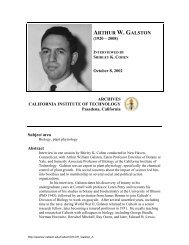Interview with Thomas A. Tombrello - Caltech Oral Histories
Interview with Thomas A. Tombrello - Caltech Oral Histories
Interview with Thomas A. Tombrello - Caltech Oral Histories
Create successful ePaper yourself
Turn your PDF publications into a flip-book with our unique Google optimized e-Paper software.
<strong>Tombrello</strong>–92<br />
TOMBRELLO: I was asked if I would step down. I lost a vote of confidence, shall we say, <strong>with</strong><br />
Willy and Gerry Wasserburg. To be blunt, the Kellogg grant got into financial trouble. We had<br />
gotten cut. They had given us a raise, which we’d had for a couple of years.<br />
ASPATURIAN: This was the NSF?<br />
TOMBRELLO: Yup. And then they cut it. Suddenly, we are in a leveraged position, and I ask<br />
everybody what they could do to spend less money. And Wasserburg had been getting maybe<br />
$200,000 a year, something like that. I basically assessed everybody <strong>with</strong> a 10-percent cut. And<br />
Gerry just could not accept going from $220,000 to $200,000. Burnett [Donald Burnett,<br />
professor of nuclear geochemistry, emeritus] was cut out entirely. He had more to complain<br />
about. He’d been probably getting $30,000 or $40,000. It was a bit of an empire. We tried to<br />
integrate intellectually the stuff that Wasserburg and Burnett were doing <strong>with</strong> the nuclear<br />
astrophysics, because it did fit. But that’s how I lost Wasserburg. And Willy just wanted<br />
everything to go to nuclear astrophysics, and he couldn’t understand why I just didn’t move the<br />
money over from some of these other grants that supported doing radiation damage and lunar<br />
samples and stuff. I just wanted to get this thing down to a level of where we could support<br />
what we had, and it was going to be, hopefully, a short-term thing.<br />
But anyway, there were people who were unhappy. I have my own management style.<br />
It’s not necessarily quite democratic. I consider democracy a spice. I mean I consider it a basic<br />
ingredient. I think it makes things work better, and I think, used sparingly, it’s nice. The rest of<br />
the time, somebody’s actually got to make decisions and not just vote on things or ask opinions.<br />
I’m not sure I asked anybody’s opinion about hiring Koonin, but I think it was a good move.<br />
[Laughter] It’s worked out well. It was that kind of thing. After I left, and I described what<br />
happened in an earlier interview [Session 2], Koonin and Barnes tried to run Kellogg, and their<br />
styles were just so different. I think Koonin basically said that he could not work <strong>with</strong><br />
Wasserburg and Barnes. And so suddenly the group did not have Wasserburg in it, and it did not<br />
have Barnes running it. Koonin took over the group. Then things in Kellogg began to take on a<br />
completely different direction, going more into high-energy nuclear physics. Koonin was putting<br />
his stamp on it. By then Willy had won the Nobel Prize [1983].<br />
ASPATURIAN: So we’re in the mid-1980s now.<br />
http://resolver.caltech.edu/<strong>Caltech</strong>OH:OH_<strong>Tombrello</strong>_T

















